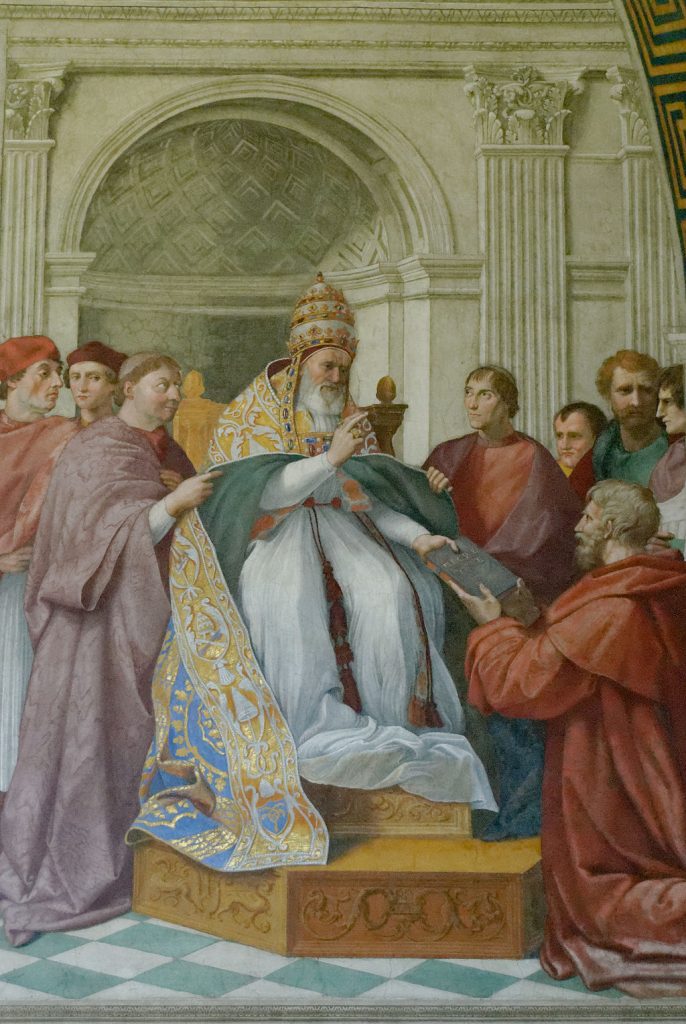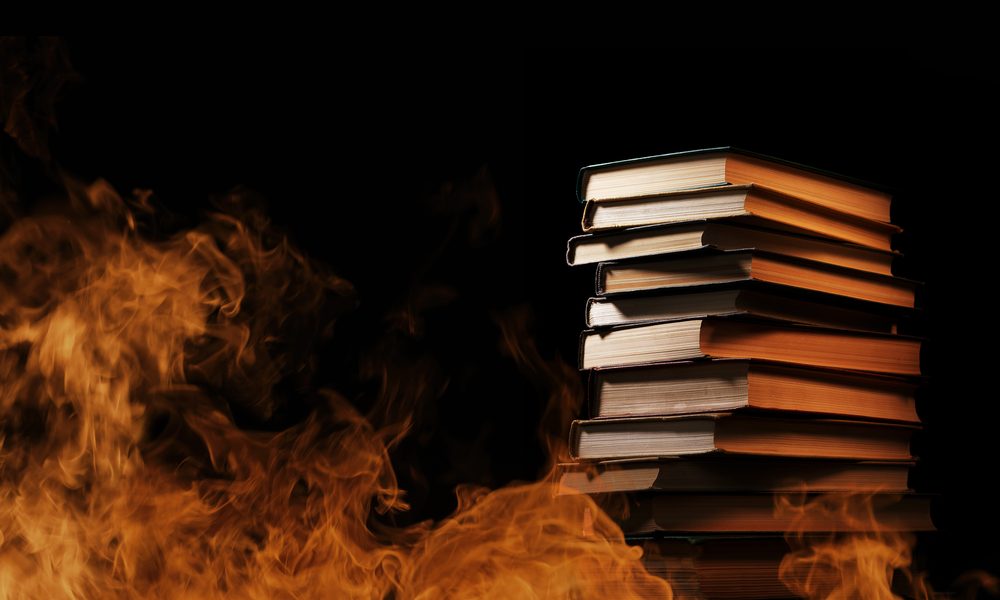
1230 AD to 1250 AD, Psalm 109: The burning of the Talmud
This site was first built in French (see www.147thgeneration.net). The English translation was mainly done using « google translation ». We have tried to correct the result of this translation to avoid interpretation errors. However, it is likely that there are unsatisfactory translations, do not hesitate to communicate them to us for correction.
(for that click on this paragraph)
Summary
This generation of the 1230s and 1240s.
According to our count, this generation is the 109th generation associated with Psalm 109. It is in this Psalm 109 that we therefore find an illustration of the facts of this generation.
In this generation, an important stage of the Christian reconquest in Spain is realized. The Christian Europe gradually getting rid of the Muslim presence, wishes to reaffirm its unity behind the common Christian banner.
Thus, the papacy in Rome increases its power over Europe, the Pope obtains that the King of England, but also the kings of Aragon, Portugal and Bulgaria declare themselves vassals of the Holy See. The King of France, Philip Augustus had also submitted to the Pope.
Pope Innocent III organizes the Fourth Ecumenical Lateran Council in 1215. He wants through this council to sit this time the religious power by opposing in particular to the “heretical” movements. The designated target of this council is the Cathare heresy then in full expansion especially in the south-west of France.
Several important decisions of the Council taken to fight against Catharism will have important and unfortunate repercussions on the Jewish people thereafter. In particular, Canon 3 organized the material repression of heresy by establishing the courts and the essentials of the procedure which was later called the Inquisition. There is no need here to explain how this Inquisition, not created against the Jews, will be formidable from the present generation.
The Cathars and the Jews had a very good relationship. It was therefore natural that, in addition to those decisions which indirectly will affect the future of the Jews in Europe, the Lateran Council does not forget to deal directly with the fate of the Jews considered as allies of the heretics and who will often have to to share the fate.
Thus the Council, in a seemingly innocuous decision, wants that in the future the Jews, like other populations, can not be confused with the « good » Christians. It is decided that henceforth Jews of the two sexes will be distinguished from other peoples by their garments.
As the fight in the Jewish ranks between supporters and opponents of Maimonides’ theses became more radical, in 1233 the inquisition began to take root in Provence to suppress heresies. In order to triumph over his adversaries, a Jew had the unfortunate initiative of provoking the intervention of the Inquisition: « You burn your heretics, » he said to the Dominicans, « persecute our own. Most of the Jews of Provence are poisoned by the impious writings of Maimonides. Burn these writings, and the frightened Jews will stop studying them.
It was not necessary to invite the Dominican monks twice to such an act. They feared, moreover, that the rationalism of Maimonides also spread among their co-religionists. The writings of Maimonides were carefully researched in all the Jewish houses of Montpellier and destroyed by fire.
This request for intervention by the Inquisition tribunal in purely religious matters internal to Judaism will have serious consequences. This generation is marked for the Jews of France by the beginning of the reign of Louis IX (1226-1270) better known under the name of Saint Louis. Louis IX’s position towards Judaism is almost unambiguous: Saint Louis agreed to be the godfather of the Jews who were baptized. In short, he liked the Jews, but converted!
It is in this context that the drama of this generation, which will upset the condition of the Jews in the West, takes place: the burning of the Talmud in Paris in 1240. It is an apostate Jew from La Rochelle, Nicolas Donin, considering that the Talmud was an immoral and offensive book to Christians, which prompted an investigation. Only Saint Louis followed it up. Throughout France, copies of the Talmud were seized, and, in 1240, a great public controversy broke out in Paris, in which Eudes de Châteauroux, chancellor of the Sorbonne, and Nicolas Donin on the Christian side, Yehiel de Paris and Moïse de Coucy on the Jewish side.
But the outcome of the jousting was obviously decided in advance. The Talmud was condemned and all his copies solemnly burnt, just as eight years earlier the works of Maimonides.
Thus the internal Jewish controversy is a fatal blow to French Judaism which before that was most promising, in the continuity of the heritage of Rashi. Without this, the French Jewish school could have had a renown equal to that of Babylon but it was destroyed by these events of the thirteenth century. In the following generation, St. Louis formalizes the rouelle (1269) and Philip Le Bel expels the Jews in 1306 contributing to marginalize French Judaism for many centuries.
Talk
The power of the papacy
In this generation, an important stage of the Christian reconquest in Spain is realized. The Christian Europe gradually getting rid of the Muslim presence, wishes to reaffirm its unity behind the common Christian banner.
On January 8, 1198 [1], Lothario de Segni became Pope Innocent III, he strengthened the pontifical power, he became the undisputed arbiter of the Christian West. He first restored the papal authority over Rome, which he reconquered in 1204. He became involved in the conflict of succession of the German Empire by taking sides with Otto, who was crowned emperor in 1209. The latter did not respect his engagements towards the pope, Innocent III excommunicates it in 1210. Weakened by the defeat of Bouvines (1214), it is Frederick II, new protected of the pope, which is crowned in 1215 with Aachen. The latter allowed the Papacy to obtain the political independence it had previously lacked. Innocent IIl also comes into conflict with the English monarch John Lackland. He finally obtained that the King of England, but also the kings of Aragon, Portugal and Bulgaria declare themselves vassals of the Holy See. The King of France, Philip Augustus had also submitted to the Pope. It is with this new papal authority on the new Christian Europe that Innocent III organizes the Fourth Ecumenical Lateran Council in 1215.
The fight against heretics
After having assured the political power of Rome over the Christian monarchs of Europe, Innocent III wants through this council to sit this time the religious power by opposing in particular to the « heretical » movements. The designated target of this council is the Cathare heresy then in full expansion especially in the south-west of France, supported in particular by Raymond IV, count of Toulouse. The latter already humiliated by Innocent III before the council is definitely stripped at the end of it (in favor of Simon de Montfort).
Two important decisions of the Council taken to fight against Catharism will have important and unfortunate repercussions on the Jewish people afterwards:

- In canon 1, the redefinition of the sacraments (disputed by the Cathars) indicating that only the priest could administer certain sacraments; bread and wine were the necessary material for the celebration of sacrifice, during which there was transubstantiation. The word appears for the first time. This means that these become flesh and blood of Christ during the Eucharist. (We will talk about this again in generation 112)
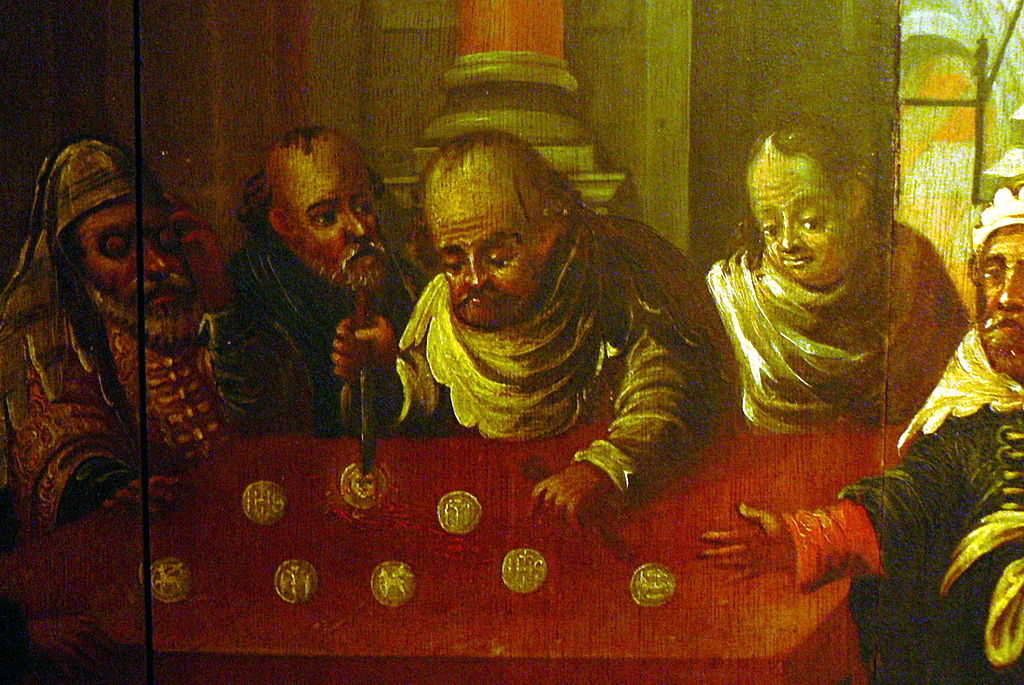
To materialize this with the popular masses in the next generations, the so-called cases of profanation of host by the Jews assimilated to the devil, became the best demonstration of this miracle (especially when the host « bleeds » by reaction to the profanation of the Jews ). This new sacrilege that will be artificially attributed to the Jews will only worsen their fate already burdened by the same fabrications about ritual crimes.
The creation of the Inquisition
- Canon 3 organized the material repression of heresy by establishing the tribunals and the essentials of the procedure which was later called the Inquisition. There is no need here to explain how this Inquisition, not created against the Jews, will prove formidable, even from the present generation.
In this context of struggle against Cathars, Guillaume de Puylaurens, one of the commentators of the time when he evokes the Castle of Monségur of the diocese of Toulouse which was taken back to the « heretics »:
- There was [2] there a public refuge of all sorts of criminals, and heretics, like the « synagogue of Satan ».
It was therefore natural that, in addition to those decisions which indirectly will affect the future of the Jews in Europe, the Lateran Council does not forget to deal directly with the fate of the Jews considered as allies of the heretics and who will often have to to share the fate.
Thus the Council, in a seemingly innocuous decision, wants that in the future the Jews, like other populations, can not be confused with the « good » Christians:
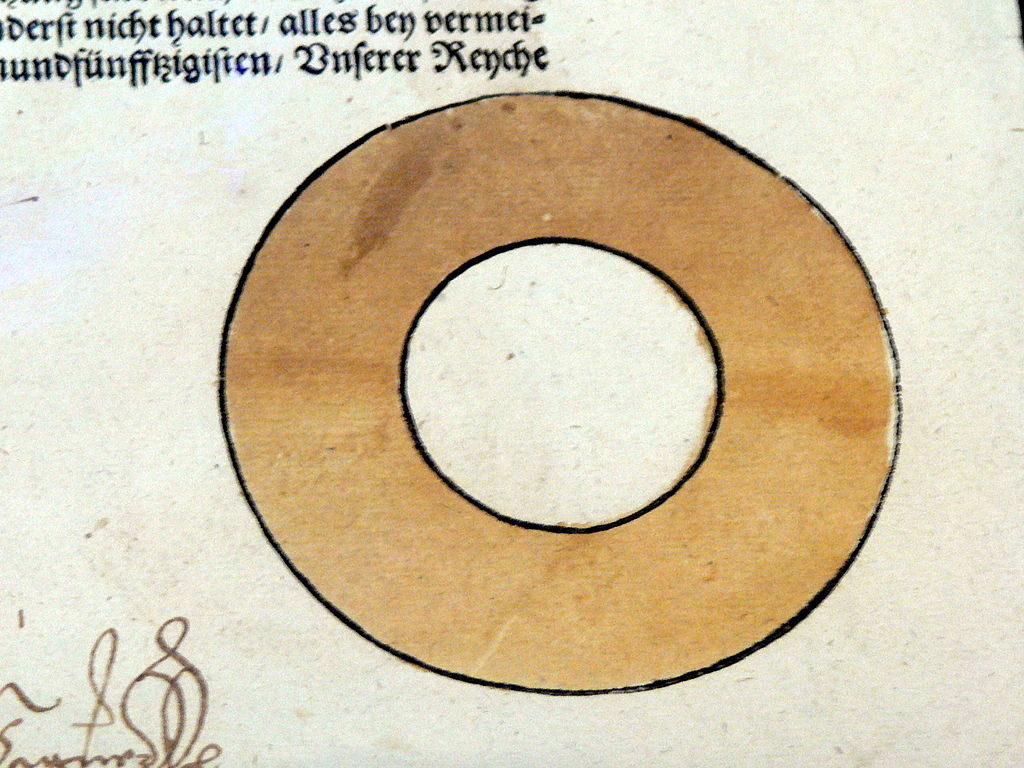
- In [3] countries where Christians do not distinguish themselves from Jews and Saracens by their dress, reports have been made between Christians and Jews or Saracens, or vice versa. In order that such enormities may not in the future be excused by error, it is decided that henceforth Jews of the two sexes will be distinguished from other peoples by their garments, as well as it has been prescribed to them by Moses.
The Lateran Council [4] merely poses the general principle of sartorial discrimination, relying for the rest on the secular authorities, to whom it is necessary to decide the difference. In appearance, the decision is not only about Jews.
In Spain, Jews still maintaining good relations with power at this time, this decision is not really applied until the situation turns around. France [5] will be the first to apply the decision of the Council by imposing the « yellow rouelle (small circle of yellow stuff) », the first real application takes place in 1234 at the Council of Arles that requires Jews to wear a distinctive mark on their clothes. This provision will be hardened and actually enforced in 1269 (with fines).
But it is already in the present generation that the Lateran Council has disastrous repercussions on Judaism.
Jewish opponents of Maimonides resort to the Inquisition
While the fight in the Jewish ranks between partisans and opponents of the theories of Maimonides is radicalized, begins to establish the inquisition:
- Around this time [6], Pope Gregory IX, resolved to exterminate completely the Albigenses, had just decreed (April 1233) that the Inquisition would work permanently in Provence, and as the bishops had seemed to him lacking vigor in the repression heresies, he entrusted the direction of this extraordinary tribunal to the fierce Dominicans.
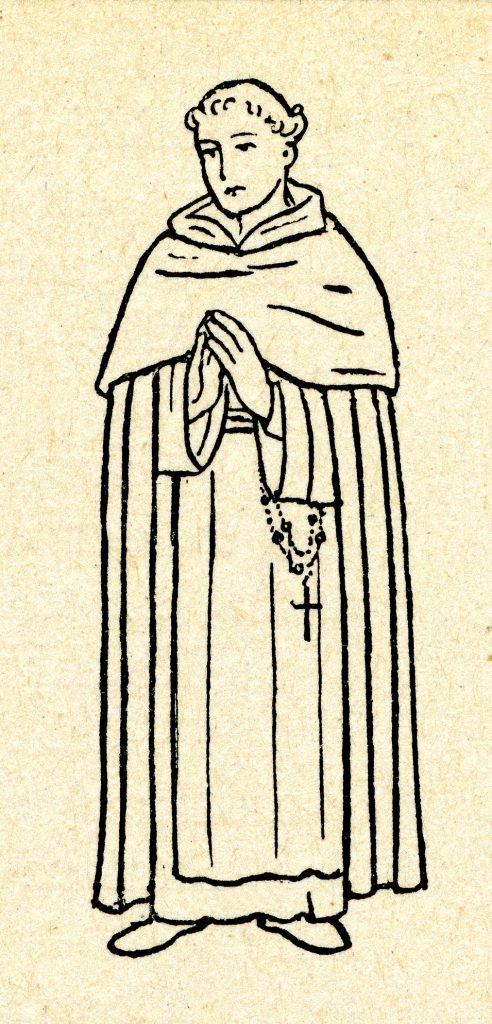
- In all the important towns of the south of France, where the Dominicans possessed convents, tribunals were organized which condemned perpetrators or suspects, and sometimes even the innocent, to perpetual imprisonment or the stake. In order to triumph over his opponents, Solomon (one of the fierce Jewish opponents of Maimonides’ theories) provoked the intervention of the Inquisition: « You burn your heretics, » he said to the Dominicans, « persecute our own. Most of the Jews of Provence are poisoned by the impious writings of Maimonides. Burn these writings, and the frightened Jews will stop studying them. It was not necessary to invite the Dominican monks twice to such an act. They feared, moreover, that the rationalism of Maimonides also spread among their co-religionists. For, around the first half of the thirteenth century (in 1230), the Guide, at the instigation of Emperor Frederick II, had already been translated partly into Latin. If at that time the Dominicans had been masters of the people, as they were later, they would have burned the Jews themselves; for the moment, they just burned the books. The writings of Maimonides were carefully researched in all the Jewish houses of Montpellier and destroyed by fire.
The first controversy of this generation is illustrated by the beginning of the psalm of this generation:

- For the conductor. Of David, a song. O God of my praise, be not silent.
- For the mouth of a wicked man and the mouth of a deceitful man have opened upon me; they spoke with me with a lying tongue.
- And with words of hatred they have surrounded me, and they have fought with me without cause.
- Instead of my love, they persecute me, but I am at prayer.
- They have imposed upon me evil instead of good and hatred instead of my love.
- Set a wicked man over him, and let an adversary stand at his right hand.
Maimonides, who had worked to bring the Jews together around their sacred books without sacrificing reason, is thus at the center of a controversy with extremely bad consequences for the Jews. Thus, the « wicked » that the psalmist claims in the conclusion of this excerpt of the psalm does not take long to appear.
Saint Louis
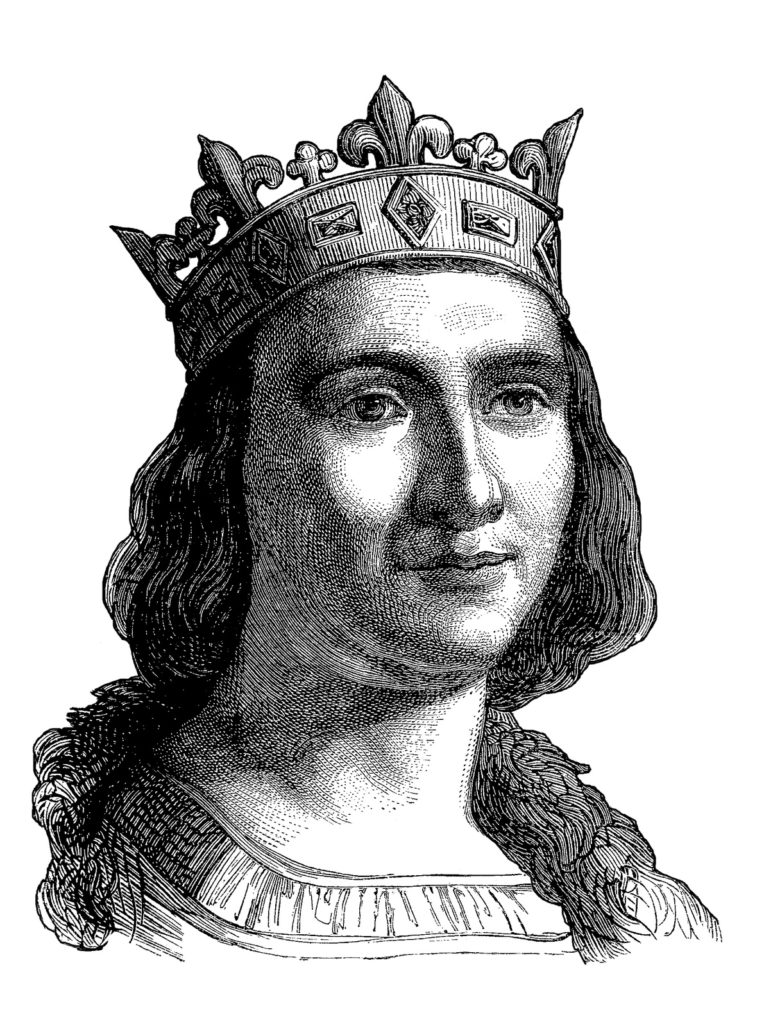
Indeed, this request for intervention of the court of the Inquisition in purely religious matters internal to Judaism will be heavy consequence, because this generation is marked for the Jews of France by the beginning of the reign of Louis IX (1226-1270) better known as Saint Louis.
Louis VIII died in 1226, his son succeeded him, he was then twelve years old and was crowned on November 29, 1226.
Officially, his mother Blanche of Castile, ensures the regency until 1234, year of the majority of Louis IX and his marriage with Marguerite supposed to bring Provence to the Kingdom of France. Louis IX governs the most populated country in the West with 12 to 13 million inhabitants and a large Jewish community and intellectually promising before it appealed to the Inquisition to solve its internal problems of doctrine.
The position of Louis IX towards Judaism is almost unambiguous:
- If we rely on a contemporary [7], William of Chartres, « he was an abomination to the Jews, odious to men as to God, so much so that he could not see them and refused to serve for his use whatever it’s their property « […]
- The ordinance of 1230 forbids Jews to lend and amputate their debts to a third party. Before the departure to the Holy Land (1248-1254), the property of the Jews is seized. […]
- A first response by the defenders of Louis IX against the accusations of anti-Semitism may seem derisory: Saint Louis agreed to be the godfather of the Jews who were baptized. In short, he loved Jews, but converted !
If the Jews [8] still preserved freedom of conscience and worship, Louis IX had a panic fear of blasphemy. It was then the pope and illustrious Parisian masters, like William of Auvergne and Albert the Great, who had taught him that the Jews « circulated, under the name of the Talmud, books filled with blasphemies and insults against the Christ, the Virgin, the Christians and God Himself « .
The burning of the Talmud
It is in this context that the drama of this generation, which will upset the condition of the Jews in the West unfolds, the burning of the Talmud in Paris in 1240:
- Dominican friar [9] of La Rochelle, the apostate Nicolas Donin went to Rome and exposed to Gregory IX that the Talmud was an immoral and offensive book for Christians. The pope addressed himself to the kings of France, England, Castile and Aragon, as well as to various bishops, enjoining them to open an inquiry to verify the validity of the accusation. St. Louis was the only one to follow up: throughout France, copies of the Talmud were seized, and in 1240, a great public controversy opened in Paris, which took part especially Eudes de Chateauroux, Chancellor of the Sorbonne , and Nicolas Donin on the Christian side, Yehiel of Paris and Moses de Coucy on the Jewish side. We possess detailed reports, both Latin and Hebrew. […]
- (to the questions asked) Stoic and honest, the rabbis faced it with great courage. […] But the outcome of the jousting, in which the accusers as well as the judges, were champions of the victorious Christ, was obviously decided in advance. The Talmud was condemned and all his copies solemnly burnt, just as eight years earlier the works of Maimonides. One of the detractors of Maimonides, Jonas Gerondi, imposing cruel penances, wandering from community to community, and proclaiming in the synagogues: « Maimonides is right and his teaching is right: we were liars! « .
- It is in vain that the Jews tried to rehabilitate their sacred texts. A few years later, Innocent IV consented to have the verdict re-examined: but a second commission, presided over by Albert the Great, only ratified it (1248).
Thus the trial that the church makes to the Jews, whether partisans or not of Maimonides, is perfectly illustrated by the rest of the psalm:

- When he is judged, let him emerge guilty, and let his prayer be accounted as a sin.
Jewish remorse
The penance of Jonas Gerondi mentioned by Poliakov will not be enough to erase the evil resulting from the internal controversy of this generation. Thus the commentators who had to judge this controversy in the years that followed were severe against those who appealed to the inquisition:
- Sixty years ago [10] (the text is dated 1295), some of the sages of Provence and Catalonia rose up against the books of Maimonides. What inspired them was not the belief in the Talmud, nor any belief but the hatred and envy that set them against each other and the inability to retaliate against their brethren. […]
- And now, I come back to what happened in the city of Paris, what was the punishment for their actions and what happened to them. From heaven, God had been present (at events), he was jealously zealous to defend the honor of his holy master and the honor of his books. He sent against the communities of France the ardor of his anger and wrath, without sparing his Torah. Do not be surprised and wonder how God was able to condemn (to the flames) one thousand two hundred pounds of the Talmud and the Haggadah because of the « guide » and the « book of knowledge ». […] Also the divine wrath was inflamed against them, as our sages have said in the treatise (of the Talmud of Babylon – Gittin (57a) ). […]
- So my brother, do not be surprised that the Blessed One has punished the Torah of the French to defend the honor of our Master Moses and that he did not spare their books of Talmud. He witnessed their chastisement in the pillar of fire and smoke until the tumult of the monks against them ceased, and then began the great persecutions. In the communities, more than three thousand men were killed, and their books in the Talmud were all burned and the prey of the flames. Then they were forbidden to openly study the Talmud books and this prohibition is still in force (in 1295).
The death of French Judaism
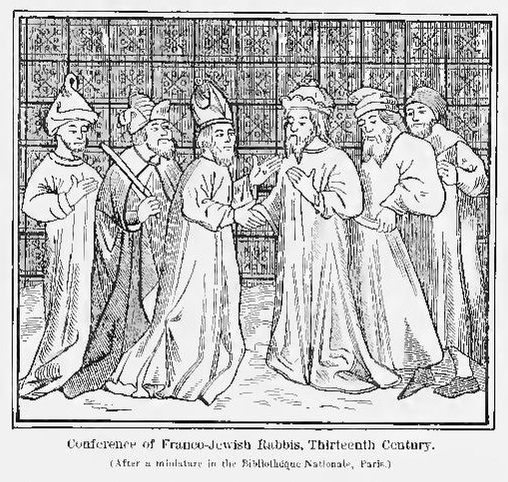
Thus the internal Jewish controversy is a fatal blow to French Judaism which before that was most promising, in the continuity of the heritage of Rashi. Without this, the French Jewish school could have had a renown equal to that of Babylon but it was destroyed by these events of the thirteenth century. In the following generation, St. Louis formalizes the rouelle (1269) and Philip Le Bel expels the Jews in 1306 contributing to marginalize French Judaism for many centuries.
Thus the feeling of curse expressed in this letter of 1295 punishing those who opened the controversy by involving the Inquisition is also expressed in the following of the psalm of this generation:

- May his days be few, and may someone else take his office of dignity.
- May his sons be orphans and his wife a widow.
- May his sons wander, and [people] should ask and search from their ruins.
- May a creditor search out all he has, and may strangers despoil his labor.
- May he have none who extends kindness, and may no one be gracious to his orphans.
Later in the 1295 letter we quoted from, the author is interested in Rav Yonah of Barcelona, one of the alleged perpetrators of this controversy, who had promised to repent at the grave of Maimonides but who for various reasons could not do it:
- He (Rav Yonah) accepted [11] and founded a great talmudic school (yeshiva); his teaching and justice were great but insufficient to repair his sin; it was there (in Toledo) that he had his punishment; the angel (of death) arrived, looked at him, and died of a death which it is not worth mentioning. […] All those who neglected not to do it (their vow of « repentance ») ended badly, they were cut off from the community and lost themselves, leaving no branch or root after them.
The symbolic fate of Rav Yonah is well summarized in the following of the psalm of this generation:

- May his end be to be cut off; in another generation may their name be blotted out.
- May the iniquity against his forefathers be remembered by the Lord, and may the sin against his mother not be erased.
- May they be before the Lord constantly, and may He cut off their remembrance from the earth.
- Because he did not remember to do kindness, and he pursued a poor and needy man, and a broken-hearted one, to kill [him].
- And he loved a curse, and it came upon him; and he did not desire a blessing, and it distanced itself from him.
- And he donned a curse like his garment, and it came into his midst like water and into his bones like oil.
- May it be to him as a garment with which he envelops himself and as a girdle with which he constantly girds himself.
- This is the recompense of my adversaries from the Lord, and those who speak evil upon my soul.
But it would not be completely right for the unfortunate instigators of this controversy to be the only ones to suffer the curses resulting from the actions of the King of France, who is far more guilty than they are.
We will see that in four generations, much of the curse announced in this psalm will fall on the Capetian line, about eighty years after the burning of the talmud, which is the « standard » duration of divine wrath.
After opening the possibility for Christians to interfere in Jewish doctrine, the trial of the Talmud takes place in Paris, aroused by a converted Jew.
In front of him, rabbis armed with their courage but who can not change a destiny that already seems sealed. One of the two rabbis who defended the Talmud in vain, Moses de Coucy, was nevertheless an advocate of respect for non-Jews.
This good disposition towards the Christians is not enough to convince his adversaries and to avoid the burning of the Talmud in Paris:
- While [12] aware of the impending danger, the whole Jewish community was fasting and praying, Jehiel twice rejected the serious accusations against the Talmud and the morals of the Jews. On the third day, Judas de Melun, another renowned Talmudic intellectual who had hitherto held to secrecy, was summoned to make it impossible for him to stop a line of defense with Jehiel. Their perfect agreement and the intimate coherence of their opinions astonished the listeners, but were not enough to avoid an outcome, which became more evident every day. In June 1242, the Talmud was condemned to the autodafé.
This desperate struggle against a seemingly inevitable outcome is summed up in the following of this generation’s psalm:

- But You, O God, my Lord, do with me for Your name’s sake, for Your kindness is good; save me.
- For I am poor and needy, and my heart has died within me.
- Like a shadow when it lengthens, I was driven about; I was stirred up like a locust.
- My knees stumbled from fasting, and my flesh became emaciated from fat.
But this Talmud affair, which took place in 1240, for the Jewish calendar in the year 5000, marks a major evolution.
Starting from this affair, Christianity definitely distances itself from Judaism. The sixth millennium of creation, in the last Jewish tradition, which begins then, is the millennium of Christian rule.
This evolution is also noticeable in the songs of minstrel of the time.
This situation where the pariah status of the Jews is confirmed but without resigning them to their attachment to the divine covenant is the subject of the conclusion of the Psalm of this generation:

- And I was a disgrace to them; they would see me, they would shake their head.
- Help me, O Lord, my God; save me according to Your kindness.
- And they should know that this is Your hand; You, O Lord, have done it.
- Let them curse and You will bless; they rose up and were ashamed, but Your servant will rejoice.
- May my adversaries don disgrace and enwrap themselves with their shame like a cloak.
- I shall thank the Lord exceedingly with my mouth, and among many people I shall praise Him.
- For He will stand to the right of the needy to save [him] from those who judge his soul.

[1] According to Jean Chélini: « Religious history of the medieval West ». Chapter: « Medieval Christendom ». (French: « Histoire religieuse de l’Occident médiéval ». Chapitre : « La chrétienté médiévale ». (p. 306 à 310) ).
[2] Collective: « The Capetians, History and Dictionary ». Chapter Herve Martin: « Louis IX (1226-1270) ». (French: « Les Capétiens, Histoire et Dictionnaire ». Chapitre d’Hervé Martin : « Louis IX (1226-1270) ». (p. 358) )
[3] Léon Poliakov: « History of anti-Semitism: from Christ to court Jews ». Chapter: « The Rouelle and the Talmud Process ». (French: « Histoire de l’antisémitisme : du Christ aux Juifs de cour ». Chapitre : « La rouelle et le procès du Talmud ». (p. 81) ).
[4] According to Léon Poliakov: « History of anti-Semitism: from Christ to court Jews ». Chapter: « The Rouelle and the Talmud Process ». (French: « « Histoire de l’antisémitisme : du Christ aux Juifs de cour ». Chapitre : « La rouelle et le procès du Talmud ». (p. 81) ).
[5] Collective: « The Capetians, History and Dictionary ». Chapter Herve Martin: « Louis IX (1226-1270) ». (French: « Les Capétiens, Histoire et Dictionnaire ». Chapitre de Hervé Martin : « Louis IX (1226-1270). (p. 361) ).
[6] Henri Graetz: « HISTORY OF THE JEWS / THIRD PERIOD – DISPERSION ». Second epoch – Science and Jewish poetry at their peak Chapter VIII – Dissensions in Judaism. Obligation to carry the wheel – (1205-1236). (French: « HISTOIRE DES JUIFS / TROISIÈME PÉRIODE — LA DISPERSION ». Deuxième époque — La science et la poésie juive à leur apogée Chapitre VIII — Dissensions dans le judaïsme. Obligation de porter la rouelle — (1205-1236). (Extrait du site web : «histoiredesjuifs.com ») ).
[7] Collective: « The Capetians, History and Dictionary ». Chapter Herve Martin: « Louis IX (1226-1270) ». (French: « Les Capétiens, Histoire et Dictionnaire ». Chapitre d’Hervé Martin : « Louis IX (1226-1270). (p. 360-361) ).
[8] According to Collective: « The Capetians, History and Dictionary ». Chapter Herve Martin: « Louis IX (1226-1270) ». (French: « Les Capétiens, Histoire et Dictionnaire ». Chapitre d’Hervé Martin : « Louis IX (1226-1270). (p. 361) ).
[9] Henri Graetz: « HISTORY OF THE JEWS / THIRD PERIOD – DISPERSION ». Second epoch – Science and Jewish poetry at their peak Chapter VIII – Dissensions in Judaism. Obligation to carry the wheel – (1205-1236). (French: « Histoire de l’antisémitisme : du Christ aux Juifs de cour ». Chapitre : « La rouelle et le procès du Talmud ». (p. 86-87) ).
[10] (directed by) Gilbert Dahan: « The burning of the Talmud in Paris, 1242-1244 ». Colette Sirat: « The manuscripts of the Talmud in northern France in the thirteenth century – Appendix ». (pp. 128-130), excerpted from Hillel ben Samuel’s letter to Maestro Gaio. (French: « Le brûlement du Talmud à Paris, 1242-1244 ». «Les manuscrits du Talmud en France du Nord au XIIIe siècle – Appendice ». (p. 128-130), extraits de le lettre de Hillel ben Samuel à Maestro Gaio ).
[11] (directed by) Gilbert Dahan: « The burning of the Talmud in Paris, 1242-1244 ». Colette Sirat: « The manuscripts of the Talmud in northern France in the thirteenth century – Appendix ». (pp. 128-130), excerpted from Hillel ben Samuel’s letter to Maestro Gaio. (French: « Le brûlement du Talmud à Paris, 1242-1244 ». «Les manuscrits du Talmud en France du Nord au XIIIe siècle – Appendice ». (p. 128-130), extraits de le lettre de Hillel ben Samuel à Maestro Gaio ).
[12] Riccardo Calimani: « The Jewish wandering ». Chapter: « Discrimination, Persecution, Survival ». (French: « L’errance juive ». Chapitre : « La discrimination, la persécution, la survie ». (p. 148) ).



